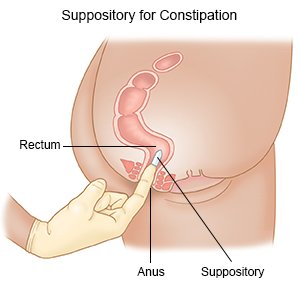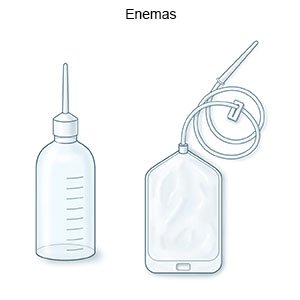Constipation
Medically reviewed by Drugs.com. Last updated on Sep 23, 2025.
What is constipation?
Constipation means you have hard, dry bowel movements, or you go longer than usual between bowel movements.
What causes constipation?
- Not enough water or high-fiber foods
- Lack of physical activity
- Certain medicines, such as opioid pain medicine, antidepressants, or high blood pressure medicine
- A medical condition such as hemorrhoids, diabetes, or a stroke
What are the signs and symptoms of constipation?
- Trouble pushing out your bowel movement
- Pain or bleeding during your bowel movement
- A feeling that you did not finish having your bowel movement
- Bloating
How is constipation diagnosed?
Your healthcare provider will ask about your symptoms and examine you. Tell the provider how often you have a bowel movement and if it is painful. Your provider may ask about your eating habits and if you exercise. Tell the provider about any medicines you take, including fiber supplements. You may need an x-ray of your abdomen. This will help your provider see if you have constipation.
How is constipation treated?
- Medicines may increase moisture in your bowel movement or increase the motion of your intestines. This helps you have a bowel movement more easily.
- A suppository may be used to help soften your bowel movements. This may make them easier to pass. A suppository is guided into your rectum through your anus.

- An enema is liquid medicine used to clear bowel movement from your rectum. The medicine is put into your rectum through your anus.

Treatment options
The following list of medications are related to or used in the treatment of this condition.
What can I do to prevent constipation?
- Drink liquids as directed. You may need to drink extra liquids to help soften and move your bowels. Ask how much liquid to drink each day and which liquids are best for you.
- Eat high-fiber foods. This may help decrease constipation by adding bulk to your bowel movements. High-fiber foods include fruit, vegetables, whole-grain breads and cereals, and beans. Your healthcare provider or dietitian can help you create a high-fiber meal plan. Your provider may also recommend a fiber supplement if you cannot get enough fiber from food.

- Exercise regularly. Regular physical activity can help stimulate your intestines. Walking is a good exercise to prevent or relieve constipation. Ask which exercises are best for you.

- Schedule a time each day to have a bowel movement. This may help train your body to have regular bowel movements. Bend forward while you are on the toilet to help move the bowel movement out. Sit on the toilet for at least 10 minutes, even if you do not have a bowel movement.
- Talk to your healthcare provider about your medicines. Certain medicines, such as opioids, can cause constipation. Your provider may be able to make medicine changes. For example, he or she may change the kind of medicine, or change when you take it.
Related medications
When should I call my doctor?
- You have blood in your bowel movements.
- You have a fever and abdominal pain with the constipation.
- Your constipation gets worse.
- You start to vomit.
- You have questions or concerns about your condition or care.
Care Agreement
You have the right to help plan your care. Learn about your health condition and how it may be treated. Discuss treatment options with your healthcare providers to decide what care you want to receive. You always have the right to refuse treatment. The above information is an educational aid only. It is not intended as medical advice for individual conditions or treatments. Talk to your doctor, nurse or pharmacist before following any medical regimen to see if it is safe and effective for you.© Copyright Merative 2025 Information is for End User's use only and may not be sold, redistributed or otherwise used for commercial purposes.
Learn more about Constipation
Treatment options
Care guides
Medicine.com guides (external)
Further information
Always consult your healthcare provider to ensure the information displayed on this page applies to your personal circumstances.
